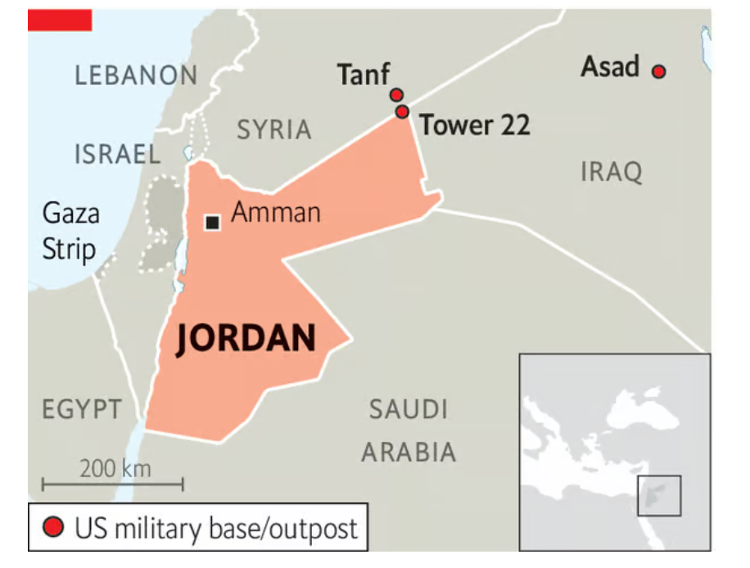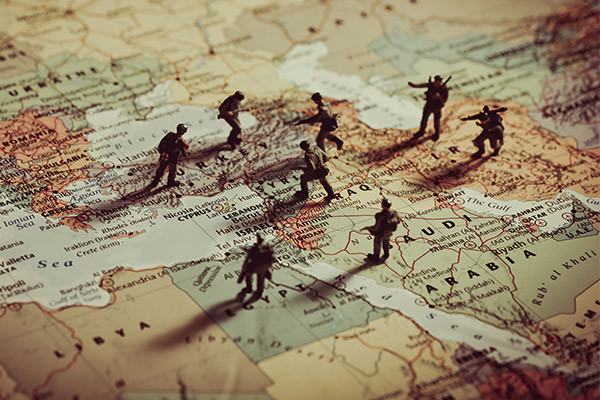Continued regional escalation and limited US strike
Targeting the American facility on the Syrian Jordanian border and the inevitable American military response to the American soldiers killed by the attack, highlighted the urgent need for The Gulf countries to swiftly deal with any potential repercussions of the American response, which is likely to occur in Syria and Iraq. At the same time, the assessment in the region is based on dealing with the broader regional escalation in the Middle East, which is expected to continue whether the American strike was limited or exceeded the familiar scope of Iranian American confrontations.

- by Rasha Al Joundy ,
- Thursday, 1st February, 2024
The Middle East is witnessing high level of tension awaiting the American response to the attack which targeted an American base on the border between Syria and Jordan, an attack for which the Islamic Resistance in Iraq has claimed responsibility.
The Gulf states perceive this attack as increasing the regional security risks by escalating tensions along the Jordanian border. Meanwhile, Jordan faces smuggling challenges across its border with Syria. Jordan addressed these threats through series of measures and attempts to cooperate with the Syrian government. But then took further military measure in the Syrian province, Al-Suwayda, which Damascus tried to deal with without seeking further escalation with its neighbor.
The initial reaction by the United Arab Emirates and Saudi Arabia after these recent escalations, and the attack on the American forces was to expedite the return of diplomatic missions to their embassies in Damascus.
These are the first high-level figures to be present in Syria since 2012 for Saudi Arabia, and United Arab Emirates sent the Extraordinary and Plenipotentiary Ambassador Hassan Ahmed Al-Shahhi who arrived in Syria and presented his credentials.
This move indicates that regional leaderships analyze the situation as critical and dangerous. Their first objective is to mediate between Jordan and Syria and to contribute in preventing Jordan from becoming one of the main targets in the Iranian-American confrontations, since this poses a sever threat to Saudi Arabia and Arab states’ security along with the United States posture in the Middle East.
The Gulf States’ decisions also suggest that they have regional plans and preparation to contain any repercussions that may arise from the expected response by the Biden administration. And that There is a prevailing estimation that Syria and Iraq are the likely targets for American actions, whether it will be limited strikes against Iran-affiliated militias in those countries or against Iranian Revolutionary Guard leaders outside Iran, which mostly located in Syria and Iraq.
According to this analysis, evaluating the outcome and scale of the anticipated operations is crucial for political and security interests in the Gulf countries.
Undoubtedly, the geographical significance of Tower22 and the fact that it is an unexpected target were considered in the decision leading to strike. This attack can be seen as part of series of escalatory operations recently undertaken by Iran in Erbil-Iraq, Pakistan, and Syria. Despite the Iranian Ministry of Foreign Affairs denial of its involvement in the drone attack on the American facility, it may be viewed as a response to the Kerman operation in Iran. Which ISIS claimed responsibility for and resulted in around a hundred Iranians death. But nevertheless, Iran accused The United States and Israel of being responsible for the attack.
Even if Iran is not seeking regional escalation or expanding the Gaza war, Iran may still respond to any American operation outside the traditional norms of its mutual confrontations with the US. And it is the purpose for Iranian officials threatening to respond to the United States’ expected attack. Surly, Iranian officials are closely monitoring the embarrassment President Biden is facing, labeled as weak and criticized for his foreign policy failure by his rival President Donald Trump, after the attack that resulted in the death of three American soldiers and the injury of dozens. It is expected that these criticisms will intensify and to be used against President Biden during the election campaign, as the anticipated American response is not expected to target Iran as a state but will likely be limited to striking its proxies in the region.
The silent agreement between Iran and the United States to prevent widespread escalation in the Middle East does not mean that the decision is confined to these two countries. Similarly, The mediation by the United Arab Emirates and Saudi Arabia to contain the border tension between Syria and Jordan does not mean that they are able to resolve the dispute itself. Especially with the ongoing American sanctions on Syria and the absence of a political solution that leads to a restructuring of the economy beyond the reliance on drugs and smuggling. And to focus on rebuilding the infrastructure, empowering the civil institutions that collapsed during the past decade, such as the healthcare and education sectors.
Even if President Biden's response was limited and adhered to the usual targeting analogue between the US and Iran, the regional countries realize that Israel can reignite the tensions anytime. Consequently, there is an increased risk of expanding the Gaza war regionally by continuing to directly provoke Iran, either within Iranian territory or indirectly by targeting critical interests of its allies. Furthermore, the recent Iranian responses, whether it was direct through targeting Erbil or indirect through allied militias in Iraq and Yemen, represent a new level of Iranian provocation. This, in turn, opens the door to escalation and potential tactical errors that could lead to strategic mistakes, which would inevitably prompt series of daring responses.
Based on these developments, the current security assessment in the Gulf region is that tensions will continue on multiple fronts in the Middle East at least for the foreseeable future. And that targeting an American facility by one of the active militias in Iraq on the Jordanian-Syrian border exacerbates Jordan's crisis and complicates its fragile arrangements with Syria. This border-crisis may worsen depending on the level of the expected American military response and emphasizes how important the containment plans for the repercussions to come from the operation being prepared in Washington, either on the security or political level. However, the containment policy quietly adopted by Gulf states is part of broader diplomatic and political efforts undertaken by these countries to deal with the escalating situation in the Middle East

Rasha Al Joundy
Research Supervisor
Read More
Areas of Expertise
- Expert in the Gulf region politics,
- Security and internal affairs and has been working on the GCC region since 2011.
Education
- Master’s degree in International Relations and World Order at Leicester University (UK 2016).
- Graduated from the Faculty of Law – University of Damascus in Syria in 2006
Bio
completed her master’s degree in International Relations and World Order at Leicester University (UK 2016). She graduated from the Faculty of Law – University of Damascus in Syria in 2006, and trained as a lawyer to register at Damascus bar association. She is an expert in the Gulf region politics, security and internal affairs and has been working on this region since 2011. Rasha Currently work as a senior researcher for Gulf affairs and supervise the training program at Dubai Pubic Policy Research Centre.

